OILED PALMS OP-ED
Fossil fuel lobby digs in its heels at COP28
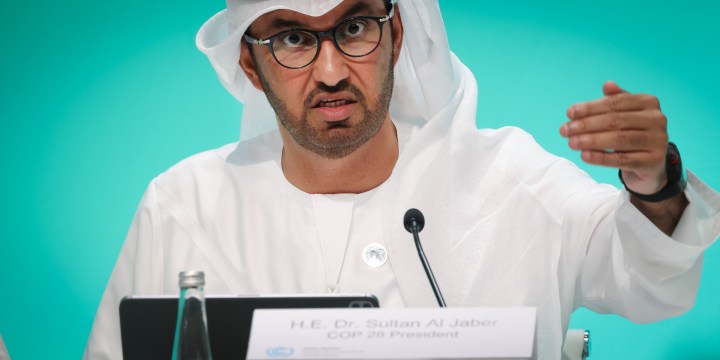
COP28 is demonstrating the lengths that fossil fuel companies and their political allies will go to defend continued exploitation of fossil fuels. It is indicative of a similar campaign being waged in South Africa. A few corporations and politicians are lining up to profit from oil, coal and gas deals. They will leave the people of South Africa with the costs.
The global climate change conference, COP28, started last week in the United Arab Emirates (UAE). It has already been mired in controversy, with fossil fuel companies, their lobbyists and the host country defending the continued exploitation of oil, gas and coal. The controversy at COP28 is not unexpected. Critics expressed concern about the conference being held in an oil-rich state. This was heightened when Sultan Al Jaber was chosen to be president of the conference. Al-Jaber is chairperson of the Abu Dhabi National Oil Company.
Last weekend, Al Jaber used his platform at COP28 to deny the global scientific consensus by claiming that there is no need to phase out fossil fuels in order to restrict global heating to 1.5°C. This type of dangerous and misleading denialism is in line with the UAE’s financial interests. Recently leaked documents published by the BBC reveal that the UAE plans to use its position as the host nation of COP28 “as an opportunity to strike oil and gas deals”.
Al Jaber’s narrative flies in the face of the facts. The scientific consensus is that even if current commitments are met, the world is headed for between 2°C and 3°C of global heating. This will cause an irreversible rise in numerous climate hazards together with catastrophic harm to humans and ecosystems. Billions of people will be displaced or killed due to floods, drought and the inability to produce food.
Read more in Daily Maverick: COP28 news hub
These impacts are already being felt around the world, including in South Africa – in 2022, in KwaZulu-Natal, more than 400 people died in the floods that wreaked havoc across the province. Climate scientists concluded that these floods were more intense and that they would occur more frequently due to human-caused global warming. Communities in KZN have long borne the impact of industries that contribute to carbon emissions and global warming. This has included gas explosions and fires, which have been regular events in south Durban, home to many oil refineries and tank farms. Further, like all people in South Africa, communities in KZN live with daily blackouts, rarely having access to electricity for more than 12 hours a day.
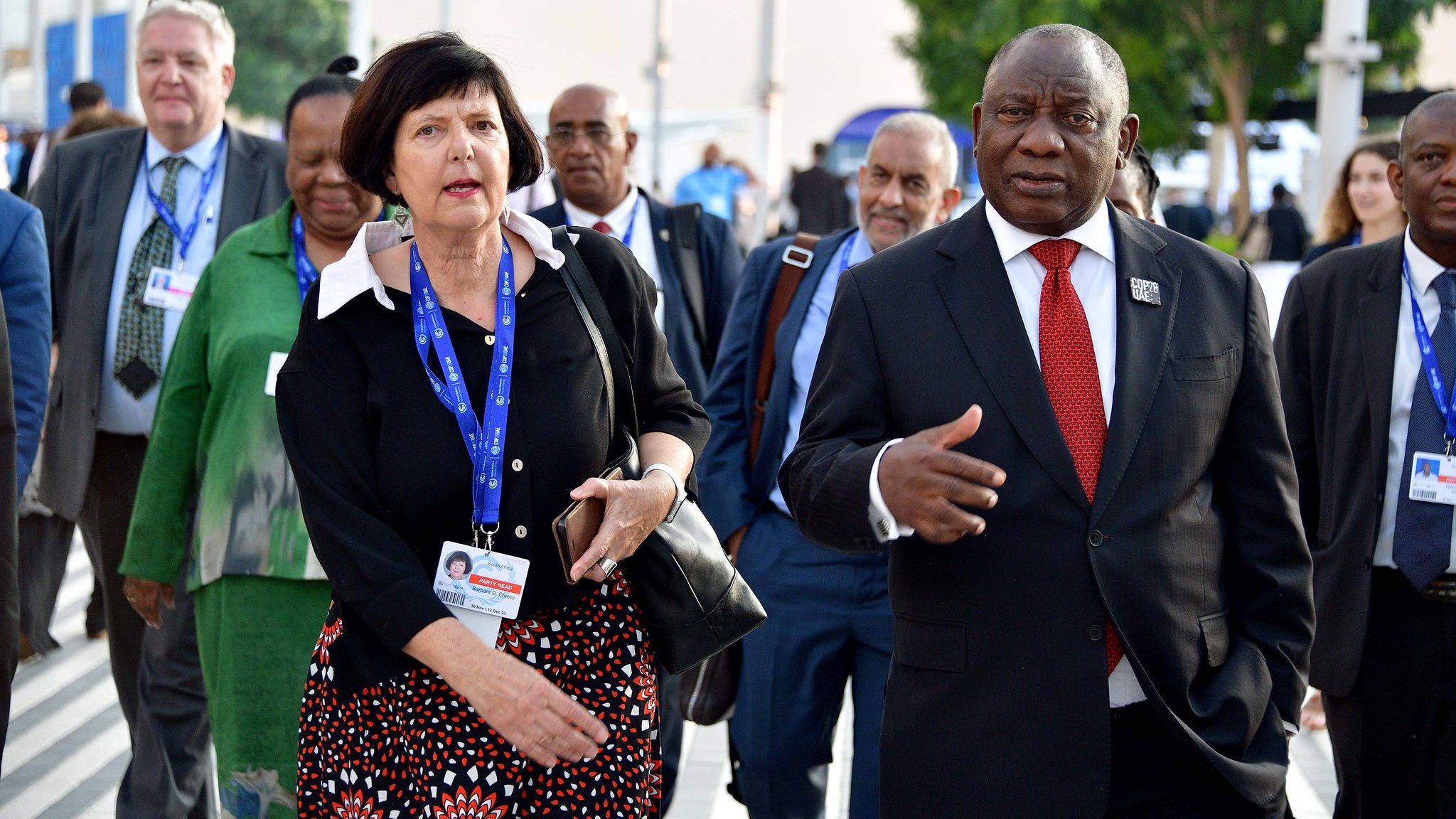
President Cyril Ramaphosa and Environment Minister Barbara Creecy at Dubai Expo City, the venue for COP28, in Dubai. (Photo: GCIS)
The story of KZN is emblematic of South Africa’s multifaceted energy, social and climate crisis. There is insufficient energy production to meet demand, leading to the rolling blackouts. At the same time, Eskom and municipalities are hiking electricity prices massively, undermining access to electricity for millions of people in South Africa.
Read more in Daily Maverick: Eskom news
The government’s response to this multifaceted crisis has been incoherent and inadequate. In part, this is because contemporary state capture and corruption have hollowed out state institutions and gutted the state’s finances. But it is also because of powerful corporations and vested interests that have long profited from the status quo in South Africa. Like the corporate interests trying to hijack proceedings at COP28, these corporate actors are resistant to changes in the structure of the country’s energy mix while seeking to control the pace and nature of the change.
Open Secrets’ new report, “Who Has the Power? South Africa’s Energy Profiteers, spotlights the key private players in the coal, gas, diesel and renewable energy industries – those the report describes as “energy profiteers”. It identifies the private corporations that stand to benefit from maintaining the status quo – a reliance on fossil fuels – in South Africa’s energy sector. It also identifies the corporations that stand to benefit from South Africa’s transition to new energy sources.
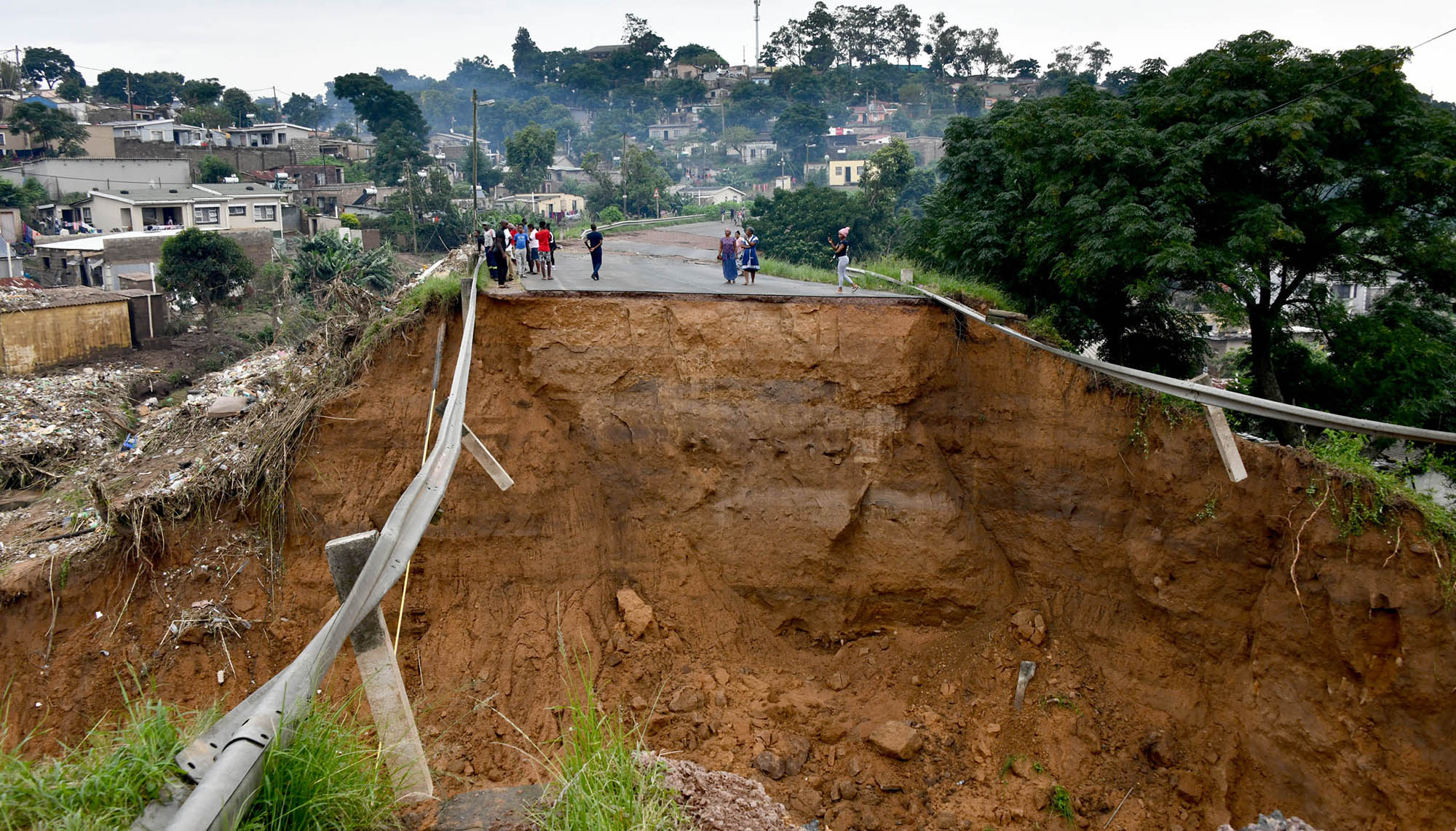
Flood-stricken parts of KwaZulu-Natal in the aftermath of heavy rains on 13 April 2022. (Photo: Flickr / GCIS)
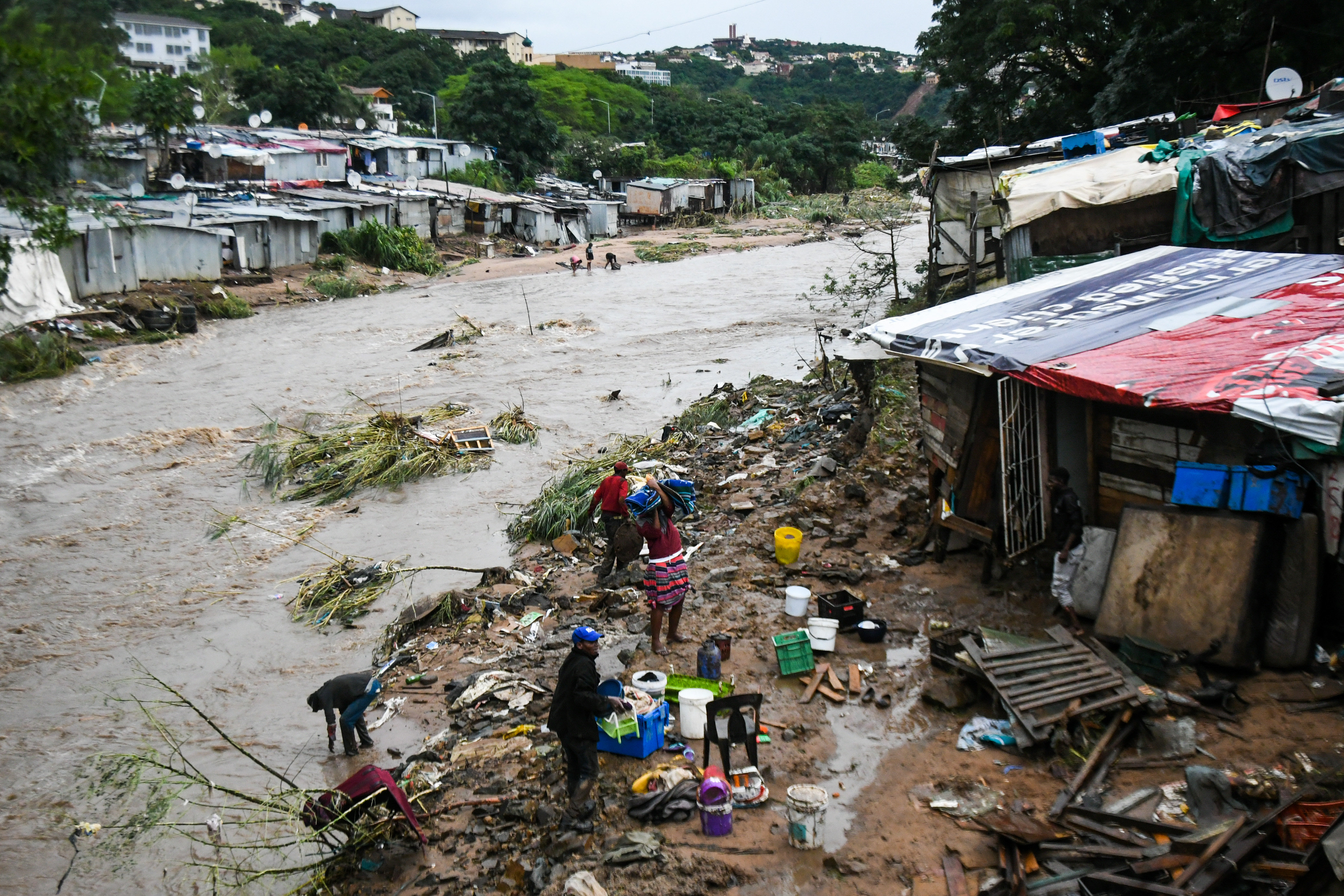
Floodwaters pour through an informal settlement in Durban between the M19 and Quarry Road on 12 April 2022. Persistent heavy rain in parts of KwaZulu-Natal resulted in widespread flooding, collapsing roads and death. (Photo: Gallo Images / Darren Stewart)
On Monday, 4 December 2023, Environment Minister Barbara Creecy launched South Africa’s Just Energy Transition Investment Plan (JET-IP) at COP28. On the same day, the Presidency launched the Just Energy Transition Implementation Plan. Both events highlighted the enormity of the challenge that South Africa faces in reaching its emission-reduction targets. South Africa contributes 40% of the African continent’s emissions, and its economy and products are deeply rooted in a carbon-intensive economy. Huge economic and human costs will result from a failure to transition away from this pattern. But the state also says it intends to place efforts to help ensure that the transition is a just one – that addresses poverty, inequality and unemployment.
Around the world, corporations and industry groups are able to dramatically outspend civil society to lobby legislators and state institutions around climate change issues.
Neither of these events addressed the current reality of a coordinated campaign to push back against a just energy transition in South Africa. The Department of Mineral Resources and Energy and its minister, Gwede Mantashe, regularly champion new oil and gas production, while spreading misinformation about the phasing out of coal power in South Africa. Large multinational fossil fuel companies, including Total and Shell, are lining up for this potential short-term profit bonanza, no doubt happy to leave the South African public to carry the inevitable economic, health and environmental costs. This is, after all, what these companies have done repeatedly around the world.

COP28 in Dubai, United Arab Emirates. (Photo: GCIS)
The “Who Has the Power?” report warns that the corporate and political interests that make up the minerals-energy complex are deliberately seeking to slow down or undermine efforts to decarbonise the energy mix and water down and/or bypass new regulations to protect people and the environment from their activities. The companies that make up this complex profit from the status quo in South Africa and have historically made super profits on the back of the poor in South Africa. These companies not only contribute the vast majority of South Africa’s emissions but also consume the majority of the energy. The minerals-energy complex shaped South Africa’s political economy – one with deep divides and high levels of inequality, with most of the country’s wealth concentrated in the hands of a few.
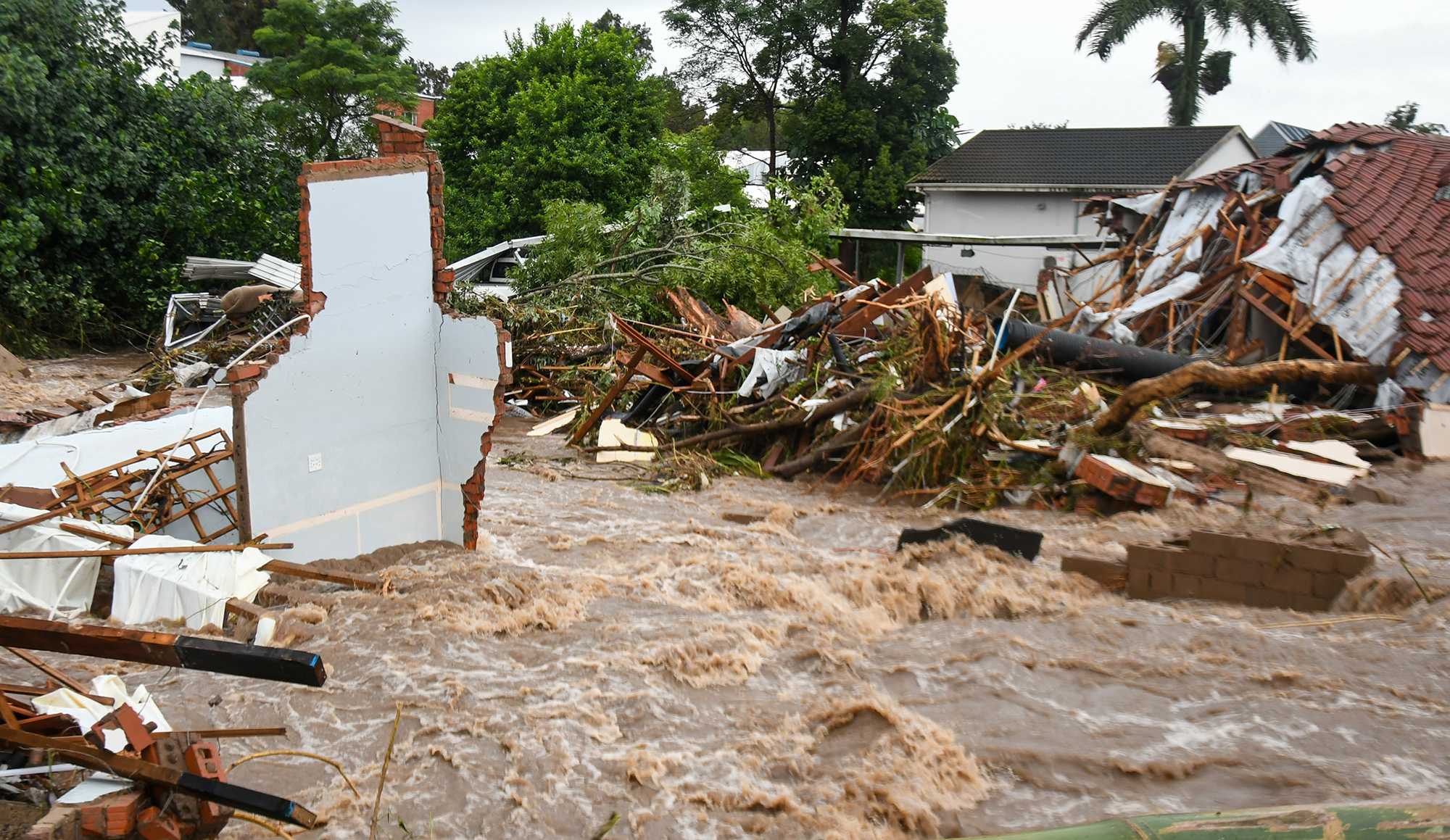
Part of Caversham Road in Pinetown was washed away on 12 April 2022 owing to persistent, heavy rain in parts of KwaZulu-Natal. (Photo: Gallo Images / Darren Stewart)
These companies are willing to spend significant resources to ensure their interests are protected in the short term, including by blocking efforts to shift away from fossil fuels to renewable energy sources. This is, of course, what we currently see playing out at COP28. But it is indicative of a broader pattern of lobbying to undermine efforts to decarbonise. Around the world, corporations and industry groups are able to dramatically outspend civil society to lobby legislators and state institutions around climate change issues. Their resources are used to water down key laws and regulations that aim to reduce emissions, protect communities and ensure proper public participation in decision-making about the energy transition.
There remains the possibility of an energy transition in South Africa that not only reduces the country’s carbon emissions but does so in a way that disrupts the economic status quo. Such an approach could see the well-being and interests of people put above the profit margins of large corporations, and it would require embracing a different economic model. A just transition cannot bow to the interests of the corporations that have always benefited from South Africa’s economic structure. Such an approach will not address the multiple overlapping crises we are facing that have emerged from a deference to private interests. People in South Africa cannot afford more of the same. DM
Zen Mathe is an Investigator at Open Secrets. Michael Marchant is the head of Investigations at Open Secrets.


















 Become an Insider
Become an Insider
Its as important to consider livelihoods and sustainability of the developing economies. They should not be forced into dept they are unable to pay.
Indeed Vusi you are correct however I strongly doubt that the oil producers or oil producing nations have this thought in mind. They are driven entirely by profit at any cost, just like the tobacco industry.
Talk talk talk is all the politicians and activists do.
Meanwhile, back at the ranch, people are quietly getting on with sorting their renewable affairs regardless of one’s opinion on climate change. In 2024 South Africa it is cheaper for a business to run solar plus storage than grid plus diesel. I’m not talking about a mom & pop business : 500 person factories.
Same applies in liquid fuels : electric vehicle with solar beats petrol/diesel cost hands down.
Renewables are cheaper and more reliable than coal and diesel. End of debate, fossil energy is dead, the funeral just needs to be arranged.
You typed you comment on a phone or a computer, right?
You realize the device you used, contains a lot of plastics, right?
Please tell us you know that plastics come from the stuff you say is dead, right?
I hope that whoever wrote this, railing against the fossil fuel industry, didn’t do so on a computer. Because, you see, the keyboard and many other components of such a computer would be made of, yes, fossil fuel products – plastics.
We can’t have that now, can we? Criticizing petrochemical companies but using their products…Using a computer containing fossil fuel products would be a big no-no for the author and would lead to suspicions of “rules for thee, but not for me.”
Likewise, I am dead sure the author always walks on foot and never uses any vehicle, not even battery cars, which also have plastics in them. The author would most certainly also be clad only in animal skins, because fabrics like nylon come from, yes, fossil fuels, but even natural fibers like cotton are farmed using diesel tractors and then shipped to SA from China, Vietnam or wherever using fuel oil-powered ships. I trust that the author didn’t sleep under a cotton duvet and also attempted to clean their teeth using a twig, because, again, toothbrushes are made from the same stuff that the author so despises.
Textbook straw-man fallacy.
Whilst everything you say is true you are missing the point. The article is about fossil FUELS and specifically the burning of those products.
I also mentioned cotton being cultivated using diesel tractors (i.e. fuel) and mentioned fuel-oil powered ships transporting your cotton t-shirt to SA (fuel again.)
DO try to keep up.
The target is the reduction of the use of fossil fuel rather than the complete eradication so as to hopefully reduce global warming to manageable levels. Petty arguments such as yours will certainly not help this cause.
It’s rich for J vN to be condescending, while they are the one who didn’t catch the gist.